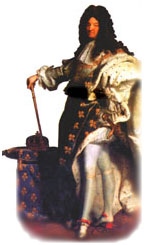Louis XIV
"Nec pluribus impar" ("None his equal")

b. Sept. 5, 1638, Saint-Germain-en-Laye, Fr. d. Sept. 1, 1715, Versailles
Louis XIV who became known by the names LOUIS THE GREAT, LOUIS THE GRAND MONARCH, OR THE SUN KING, French LOUIS LE GRAND, LOUIS LE GRAND MONARQUE, OR LE ROI SOLEIL, king of France (1643-1715) who ruled his country, principally from his great palace at Versailles, during one of its most brilliant periods and who remains the symbol of absolute monarchy of the classical age. Internationally, in a series of wars between 1667 and 1697, he extended France's eastern borders at the expense of the Habsburgs and then, in the War of the Spanish Succession (1701-14), engaged a hostile European coalition in order to secure the Spanish throne for his grandson.
Louis XIV (born 1638, ruled 1643-1715) inherited this power from his father and carried it further. He was styled the Grand Monarch, and his brilliant court at Versailles became the model and the despair of other less rich and powerful princes, who accepted his theory of absolute monarchy (L'etat c'est moi, "I am the state"). Until 1661 the government was largely in the hands of the wily Italian Cardinal Mazarin. At the cardinal's death Louis declared that he would be his own prime minister. From then on he worked faithfully at his "trade of a king."
A passion for fame and the desire to increase French territory in Europe were the leading motives of Louis XIV. He neglected the opportunities to gain an empire in America and India and involved France in wars that ruined the country financially and paved the way for the outbreak of the French Revolution.
His first war, fought from 1667 to 1668, was an attempt to enforce flimsy claims to part of the Spanish Netherlands (Belgium). His second (1672-78) was directed against "their High Mightinesses," the States-General of Holland, who had blocked his objective in the first contest. In spite of the great military power of France, the Dutch admiral De Ruyter twice defeated the fleets of the French and their English allies, and Louis XIV failed ingloriously in his attempt to conquer Holland. The third war (1689-97) also was directed chiefly against Holland, whose stadholder had by then become King William III of England. The German province of the Palatinate was terribly wasted, but the Peace of Ryswick brought only slight gains for France. Louis's last and greatest effort was the War of the Spanish Succession (1701-13). In this conflict the English duke of Marlborough was the principal leader of the opposing European coalition. The right to seat his grandson Philip V on the throne of Spain was small compensation for the thousands of lives and the millions in treasure that the French king wasted in the struggle.
Millions more were spent by Louis in building the beautiful palace at Versailles, near Paris, and in maintaining his brilliant court. There, etiquette became the "real constitution of France." It required seven persons, some of them the highest princes of the realm, to put the king's shirt on him at his getting up (levee) in the morning. A French historian says of Louis XIV: "He was a god in his temple, celebrating his own worship in the midst of his host of priests and faithful." This extravagance of the court meant a heavy burden of taxation for the common people, who were thereby reduced to a misery so great that they eventually rose up in rebellion and drove the Bourbons from the throne.
Louis XIV had the distinction of ruling longer than any other European king: it was 72 years from the time when he ascended the throne, as a child of less than 5, until his death in 1715. His 5-year-old great-grandson, Louis XV, the last son of the duke of Burgundy, succeeded the Grand Monarch, who had outlived both his son and his son’s son.

